USA
President Donald Trump has banned citizens of 12 countries from traveling to the United States and restricted access to citizens of seven other countries, citing national security concerns to revive and expand a signature policy of his first term that will primarily affect people from Africa and the Middle East.
The announced ban applies to nationals of Afghanistan, Myanmar, Chad , the Republic of Congo , Equatorial Guinea , Eritrea , Haiti, Iran, Libya , Somalia , Sudan , and Yemen. The enhanced restrictions apply to nationals of Burundi, Cuba, Laos, Sierra Leone, Togo, Turkmenistan, and Venezuela who are outside the United States and do not have a valid visa.
This policy went into effect on Monday and has no deadline. Here's what you need to know about the new rules:
How Trump justified the ban
Since returning to the White House, Mr. Trump has launched an immigration enforcement campaign that has pushed the limits of executive power and clashed with federal judges trying to rein him in.
The travel ban stems from a January 20 executive order by Trump directing the State Department, the Department of Homeland Security and the Director of National Intelligence to compile a report on "hostile attitudes" toward the United States.
The goal is to "protect citizens from foreigners who intend to commit terrorist attacks, threaten our national security, espouse a hateful ideology, or exploit immigration laws for malicious purposes ," the administration said.
In a video posted on social media, Mr. Trump linked the new ban to the terrorist attack in Boulder, Colorado, saying it highlighted the dangers posed by some visitors who overstay their visas. The man charged in the attack is from Egypt , a country not on Mr. Trump's list of restricted countries. U.S. officials say he overstayed his tourist visa.
Who is exempt from the ban?
- Green card holders
- Individuals with dual nationality, including U.S. citizens who also hold nationality from one of the prohibited countries.
- Certain athletes: Athletes and their coaches traveling to the United States for the World Cup , the Olympic Games , or any other major sporting event determined by the U.S. Secretary of State.
- Afghans who have worked for the U.S. government or its allies in Afghanistan and who hold an Afghan Special Immigrant Visa.
- Iranians belonging to an ethnic or religious minority fleeing prosecution
- Certain foreign nationals employed by the U.S. government who have served overseas for at least 15 years, as well as their spouses and children.
- People who were granted asylum or admitted to the United States as refugees before the ban took effect.
- Individuals with family members in the United States who are applying for a visa for their spouse, children, or parents.
- Diplomats and officials of foreign governments on official visits
- People who travel to UN Headquarters in New York solely for official UN business.
- Representatives of international organizations and NATO on an official visit to the United States.
- Children adopted by U.S. citizens
Which countries are affected?
Mr. Trump said that citizens of the banned countries posed "terrorism-related" and "public safety" risks , as well as risks of overstaying their visas. He also said that some of the countries had gaps in screening and vetting , or had consistently refused to take back their citizens.
Its findings draw heavily on an annual Homeland Security report on tourists, businesspeople and students who overstay U.S. visas and arrive by plane or boat, singling out countries with high rates of visa overstayers.
"We don't want them ," Mr. Trump said.
The inclusion of Afghanistan has angered some advocates who have worked to resettle its population. The ban makes exceptions for Afghans with special immigrant visas, who have typically worked most closely with the U.S. government during the country's two-decade war.
The list can be amended, the administration said in a document, if authorities in the designated countries make "material improvements" to their own rules and procedures. New countries can be added "as threats emerge around the world . "
State Department Guidelines
The State Department on Friday asked U.S. embassies and consulates not to revoke visas previously issued to people from the 12 countries affected by the ban.
In a cable sent to all U.S. diplomatic missions, the department said that " no action should be taken on issued visas that have already left the consular section" and that " no visas issued before the effective date should be revoked under this proclamation . "
However, visa applicants from affected countries whose applications have been approved but have not yet received their visas will be denied, according to the cable signed by Secretary of State Marco Rubio . And, unless an applicant meets narrow criteria for exemption from the ban, their application will be rejected starting Monday.
How the ban differs from the 2017 ban
At the start of his first term, Donald Trump issued an executive order banning citizens of seven predominantly Muslim countries—Iraq, Syria, Iran, Sudan, Libya, Somalia, and Yemen—from traveling to the United States.
It was one of the most chaotic and confusing moments of his young presidency. Travelers from these countries were barred from flights to the United States or detained at American airports after their arrival. They included students and professors, as well as businesspeople, tourists, and people visiting friends and family.
The order, often referred to as the "Muslim ban" or "travel ban ," was revised following legal challenges until a version was upheld by the Supreme Court in 2018. The ban affected various categories of travelers and immigrants from Iran, Somalia, Yemen, Syria, and Libya, as well as North Koreans and certain Venezuelan government officials and their families.
Reactions to Trump's order
The government of Venezuelan President Nicolás Maduro condemned the travel ban, calling it in a statement a "campaign of stigmatization and criminalization" against Venezuelans.
Chadian President Mahamat Deby Itno announced that his country would suspend visas for U.S. citizens in response to the ban. Refugee aid and resettlement groups also denounced the move.
"This policy has nothing to do with national security: it aims to sow division and denigrate communities seeking safety and opportunity in the United States ," said Abby Maxman, president of Oxfam America. But reactions to the ban range from anger to cautious relief and support.
In Haiti , radio stations received a flurry of calls Thursday from angry listeners, many of whom said they were Haitians living in the United States and who accused Mr. Trump of being racist , noting that people in several of the targeted countries are Black.
Haitian-American Elvanise Louis-Juste, who was at the Newark, New Jersey, airport on Sunday waiting for a flight to her home state of Florida, said many Haitians who want to come to the United States are simply seeking to escape the violence and unrest in their country.
"I have family in Haiti, so it's pretty upsetting to see and hear ," Louis-Juste, 23, said of the travel ban. "I don't think it's a good thing. I don't think it's a good thing. It's very upsetting."
William Lopez, a 75-year-old real estate investor who arrived from Cuba in 1967, supports the travel ban.
"These are people who come but don't want to work, they support the Cuban government, they support communism," Lopez said at a restaurant near Little Havana in Miami. "What the Trump administration is doing is perfectly fine."



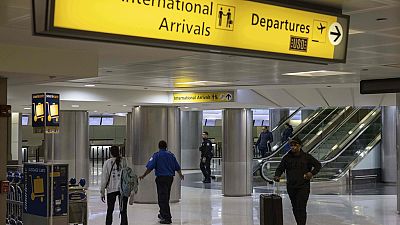

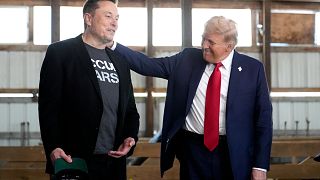
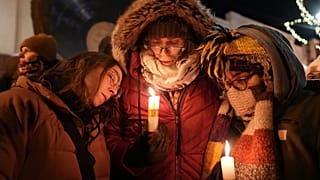
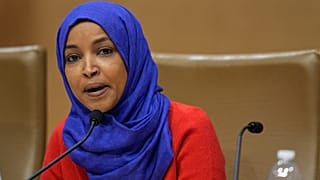
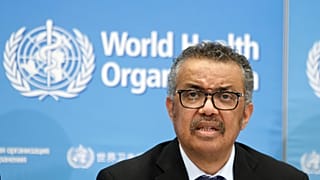
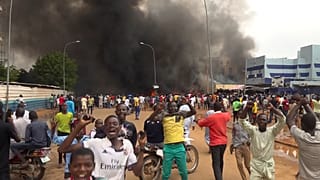
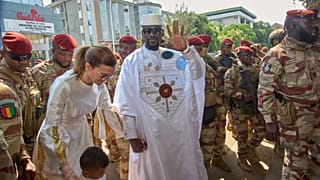
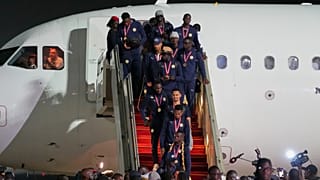
01:51
Man arrested after spraying unknown substance on Rep. Ilhan Omar
00:58
Blatter backs FIFA World Cup boycott over Trump policies
01:12
Iran warns US not to launch military action as activists say protest death toll near 6,000
Go to video
Venezuela has had enough of orders from Washington, says interim leader Rodríguez
00:00
'Tired but resolved': Minnesotans protest after second fatal ICE shooting
01:01
South Africa to step aside from G20 during United States presidency